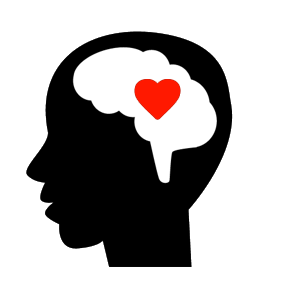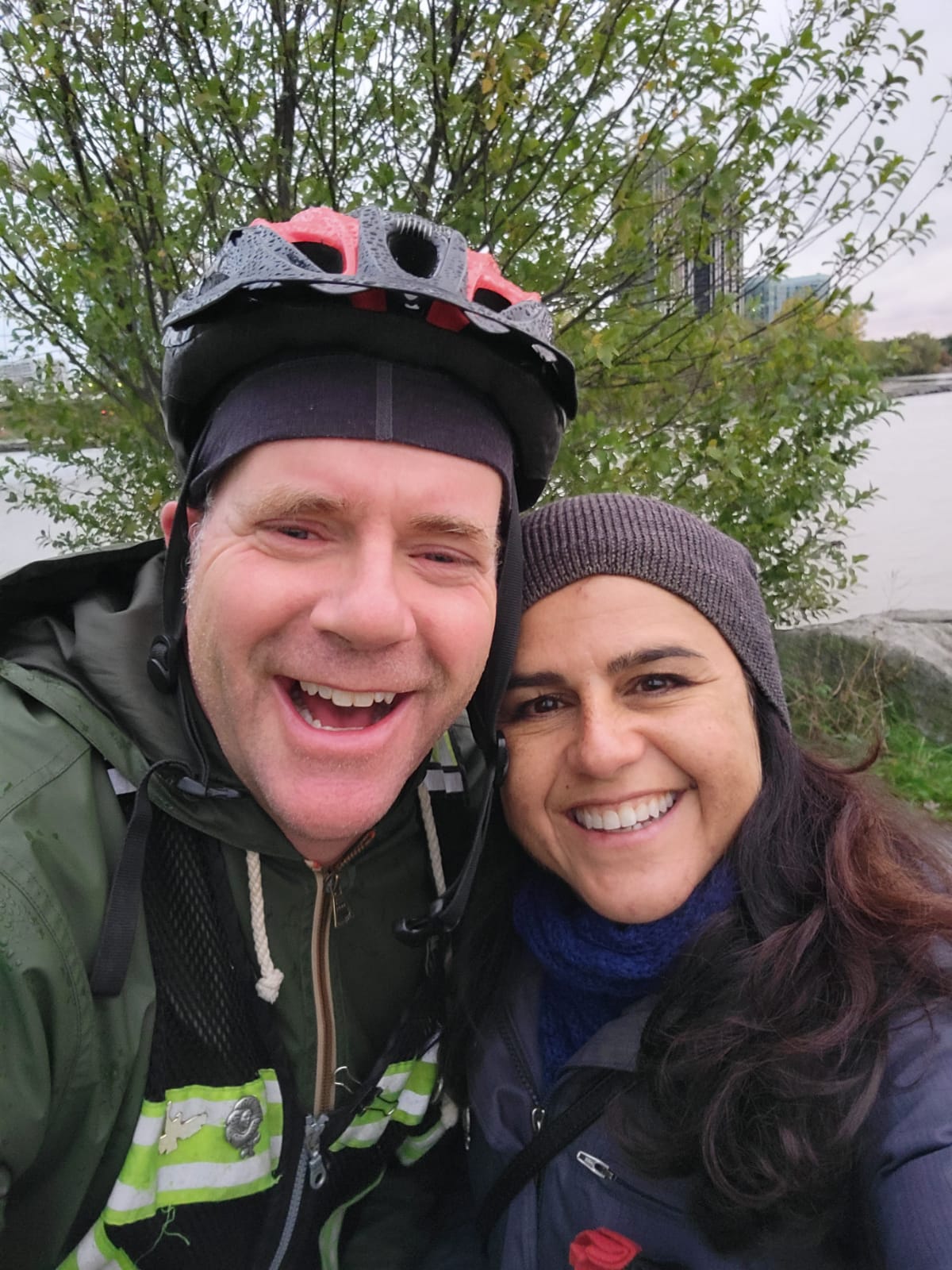John Richmond, BSW, MSW, RSW (ON, BC)
Stroke Survivor
Social Worker – Rehabilitation Medicine
Turning patient knowledge and patient experience into “expertise”
How many times have you done something that seems like common sense or because you had no other choice only to discover some “expert” has taken your idea and run with it – giving it a fancy name, obtaining grants, doing research, writing articles and appearing on CBC to pontificate about their “new” idea?
That happens to those of us living with disabilities all the time I suspect. Our resourcefulness and expertise are appropriated (a polite, academic term for stolen) by so called experts who then turn around and sell us back our own lived experienced, re-packaged with fancy words and graphs.
Who would have imagined something I’ve been doing my entire life – cycling, now with my partner, Paula, also a social worker – could turn out to be a “treatment”?
Common Sense Wellness and Rehabilitation
That’s what happened to me after a lifetime of taking the bus and riding my bike, mainly to save money but also out of a long standing concern about climate change. I attended a webinar sponsored by my local municipal government on “active transportation”. I thought it sounded like an interesting idea, so I signed up. And it was a good webinar, but it was also strange – a bunch of consultants with fancy lingo talking about cycling and public transit as if it was a brand-new concept. I discovered the internet was full of information on the topic, and my local library even had had a book on active transportation that was big enough to use for my chair yoga class.
Social Work and “Social Interventions”
After I had my stroke, I had the same experience. I’ve spent a career as a social worker connecting my clients to community social supports because I know from experience and from my time in social work school that community support and engagement is good for you. It’s not rocket science and you don’t need a PhD.
It started with helping children with autism attend regular schools: “normal” classrooms and fully integrated recreation programs where they had the same opportunities and experiences as “normal” kids. No surprise – behaviours changed when kids experiencing (severe) autism spent time socializing in a “normal’ environment. I could see the children were happier (after a transition period) and helping others was good for the kids not experiencing autism or what we call neuro-cognitive disorders but what I prefer to call neuro-diversity.
I practiced the same common sense social work on Vancouver’s Downtown Eastside where I worked with folks experiencing homelessness or poor-quality housing. The most obvious problem to me seemed to be social isolation and marginalization. The solution? Community involvement and inclusion. It was not my idea, many of my clients were already “treating” themselves – engaging in social supports like First United Church, the Carnegie Centre or Co-op Radio and they often reported being happier for it. So I convinced them to take other folks with them and introduce them to what they were doing; perhaps it was reading poetry or producing a radio show.
Other ideas I had that worked out rather well were growing your own veggies, cleaning windows for store owners in Gastown (as an alternative to panhandling) and volunteering at the local drop-in centre. I did the same thing at a Toronto-area hospital working with my clients to build a community garden – and the National Farmers Union were nice enough to make a video about it.
My Stroke
Fast forward a decade or two and I had a stroke following a bike accident. Like many of you, I lost my driver’s license. It was a shock and somewhat scary. But I didn’t think too long about it. The moment I could walk again – with a cane – I started taking the (cheap) bus to my local public (also affordable) gym for my physio, and then I would hang out at the local library (free) and coffee shop. The library had free wifi, books and movies, chair yoga and friendly faces. The coffee shop had cheap coffee and also many friendly folks (some of whom I didn’t know) who asked, “What happened to you?” and then proceeded to tell me about their own friend or family member who survived a stroke “and is doing great”.
I did what I would have told my own clients to do: “Don’t sit at home watching Netflix on the couch no matter how comfortable that might be. Get out and join stuff and be as active as you can be in your community (or communities). I went “forest bathing” as the Japanese call it – a well established wellness “treatment” – walking and hiking in the forest as a kind of mindfulness as well as physical rehab. I walked on the beach and in the ocean. My physiotherapist recommended balancing on beach logs – on the same beach were they filmed many of the iconic scenes from the famous Tv series The Beachcombers.
What we already do and know is being officially recognized as treatment: social prescribing
Well, what do you know? The kinds of things many of us stroke survivors do just to survive – like volunteering at local food co-operative to access cheaper healthy food or just taking the bus – has a fancy new clinical term in health care: social prescribing and a fantastic website: socialprescribing.ca.
As a trained horticultural therapist – yes, it’s a real thing – I like to think social prescribing – the prescription of social interventions such a March of Dimes support group, or starting your own Stroke Survivor Advocacy Group – started, in North America, with Alice Burlingham a Michigan social worker who repackaged a centuries long tradition of having hospital patients and prisoners work on farms – into an official treatment (horticultural therapy) for soldiers from WW 1 experiencing shell shock (now called Post-Traumatic Stress Disorder).
Since I’m writing this as a stroke survivor and not as a social worker, I won’t bore you with the science behind social prescribing. You already know the downside of being lonely, being stuck in a hospital bed or being stuck in a rural community with no train service or affordable transit. And you know how wonderful it is to garden with other people or help out at your local food bank. We all need to be needed. We all want to be loved. And to love others. And feeling connected and being connected is good for your brain. It helps you heal.
The good news for stroke survivors is that social prescribing will lend a whole new level of credibility to the things we ourselves have been doing from the moment we survived our first or second strokes. I’m already asking Doctors to prescribe recreation therapy, forest bathing, horticultural therapy, and adapted outdoor rec for patients and asking social services, hospitals, and insurance providers to cover the cost associated with these activities. Our brains are damaged and like a muscle that has atrophied, need exercise and stimulation. Social prescribing is like a bounty of nutrition for our recovering brains.
As stroke survivors, we must start insisting that social prescribing be included in the post stroke rehabilitation best practices guidelines in Canada. And most importantly, that our lived experience and knowledge as stroke survivors be officially recognized as equal to professional expertise.
For some good ideas on how we can own our treatment, data and experience check out https://www.savvy.coop/ , a patient-owned co-operative in the US.


One thought on “Social Prescribing and Stroke Rehabilitation”
I was an aba therapist before my stroke. Working with autistic children. Integrating them in regular daycare and school.
While still in rehabilitation after my stroke I started volunteering at the children’s hospital.
My life started to make sense again.
All my rehab therapists saw a big change in my mood. I was happier and less depressed.
I wanted to return to work so bad and couldn’t imagine what my life could be without it.
Volunteering gave me purpose.
I felt good about myself.
It has been almost 12 years since my stroke. I have not returned to work and will not ever.
I am ok with this now . I still volunteer mostly with heart & stroke foundation and at my local hospital on the best practices comitee.
I am an ambassador of the community of survivor’s Facebook page and also the care supporters community.
I host the living with stroke program twice a year.
Stroke has put me down but I am still standing, alive and active.